Are you getting more Libribot matches than you really want?
This is not a problem we expected, but we have, in fact, recently received a handful of emails with requests from users who were unhappy because they were getting too many matches. The source of their discontent: eBay.
This is not, of course, the majority view. Since we started including eBay in our searches last summer we have received many appreciative emails from regular users thanking us for this expansion. I was, frankly, surprised at how enthusiastic the response was. The number of clicks, and purchases, has, as a result, significantly increased.
While the addition of eBay was applied generally, it is the Libribot matches that have, in particular, increased. While most of our Libribot users have been happy with this, two or three have written to complain about getting too may matches and that eBay was the primary source of their surfeit. These particular users told us they hardly ever find what they are looking for on eBay and wanted to know if there was some way to eliminate all the eBay items from their Libribot search results. When they wrote to us about this our answer, unfortunately, was “no.”
But we hate having “no” for an answer (Al especially). So we (mostly Al) pushed this forward on the to-do list. We have now added another new feature that provides check boxes for all the sites that Libribot can search. If you don’t want books from a given site (or sites) all you have to do is go to your Account Details page and uncheck its box. It will look like this:
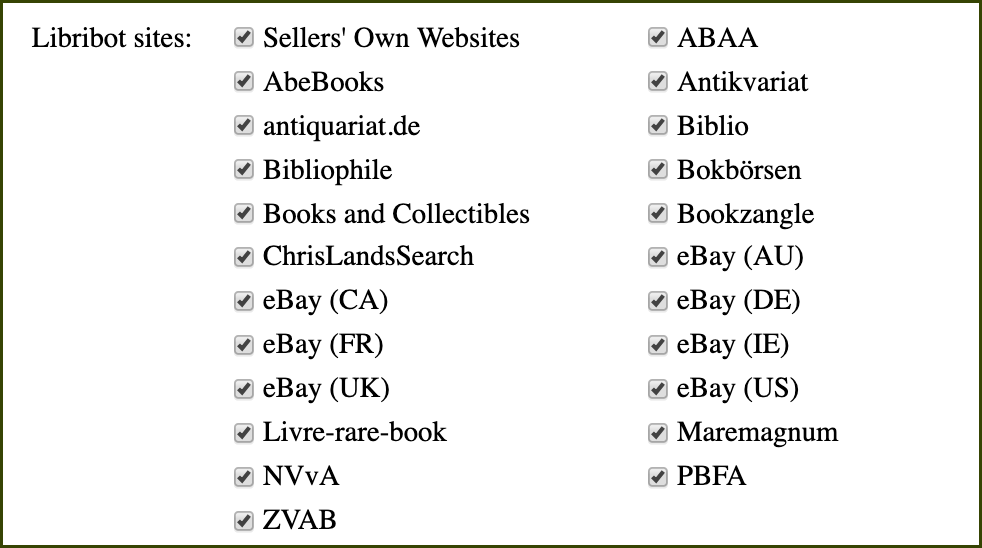
Unchecking the box for an individual site will tell Libribot to ignore that site when it is searching for books on your want list. It will not, however, have any effect on the conventional searches you make using the home page form. The way that works has not been changed.
You also need to be aware that this Libribot site exclusion will apply to all your wants. If you only want to exclude a site from searching some of your more fertile wants, but still want to leave that site active in searches for other rarer items, then you need to do something else.
You may already be familiar with the exclusion filters that prevent matches on books that include specified keywords. The same filters will also work with the names of bookselling sites. For example, if you want to exclude eBay matches from your searches then all you need to do is put [ebay] into the keywords field of the Libribot search form. This will exclude everything that has the word “ebay” anywhere in the description, including the name of the site where the item is for sale. You will have to do this individually for each of the permanent wants you have saved to your Wants Manager. If you have a large number of wants then this could take a long time. However, if you are like most users with multiple wants you probably find that it is only a small portion of those wants that produced a large volume of unwanted results. If you set up an exclusion for just those wants you will probably find that your results become quite manageable and you can leave the rarer items unchanged.
However, if you are certain you never want to see any books that are for sale on eBay then you can simply put [ebay] into the “Keyword Filters” box on your Account Details page. This will prevent eBay matches being made not only by Libribot, but by all the one-off searches you may make manually from the home page.
Of course, these techniques are not limited to eBay. You can use them to create an exclusion filter for most of the sites we search. Most, but not all. For example, using [bibliophile] as a keyword exclusion will filter out all the books from the bookselling site with that name, but it will also exclude all the books where the word “bibliophile” appears as part of the title or description. This might filter out items you actually want. There are several sites where some caution may be necessary.
We think this new feature will be helpful for many of you. More are in the pipeline. If you have any suggestions for other additions please let us know.

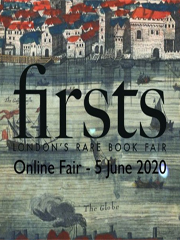

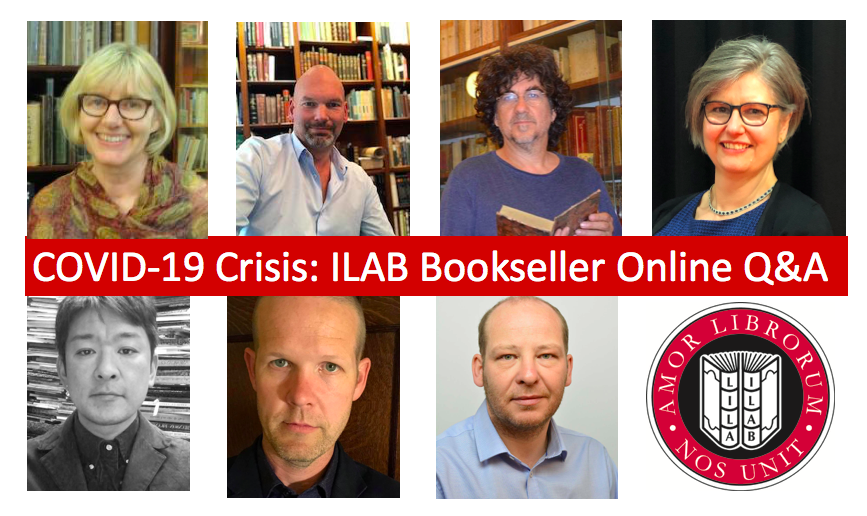 The ILAB has organised a ZOOM webinar for members of the worldwide book trade to discuss the COVID-19 pandemic and its impact on their business now and in the future
The ILAB has organised a ZOOM webinar for members of the worldwide book trade to discuss the COVID-19 pandemic and its impact on their business now and in the future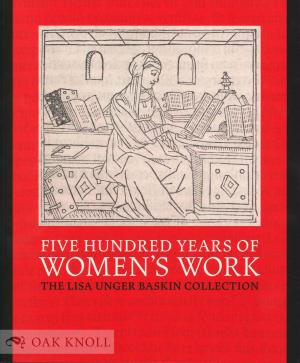
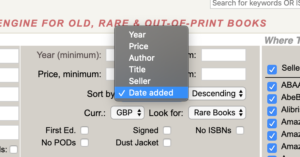 A few weeks ago we quietly released an exciting new feature for viaLibri. You can now sort results by the date they were put up for sale. This is a change that a lot of people have asked for in the past, and we think it will be very useful for a lot of people.
A few weeks ago we quietly released an exciting new feature for viaLibri. You can now sort results by the date they were put up for sale. This is a change that a lot of people have asked for in the past, and we think it will be very useful for a lot of people. I recently listened with great interest to an online recording of the 2019 Malkin Lecture delivered last month at the Rare Books School in Virginia by Heather O’Donnell and Rebecca Romney. Its provocative title was: “The Right and Wrong Ways to Collect.” If you missed the live performance and haven’t yet caught the recorded version then I would strongly encourage you to click this link –
I recently listened with great interest to an online recording of the 2019 Malkin Lecture delivered last month at the Rare Books School in Virginia by Heather O’Donnell and Rebecca Romney. Its provocative title was: “The Right and Wrong Ways to Collect.” If you missed the live performance and haven’t yet caught the recorded version then I would strongly encourage you to click this link – 
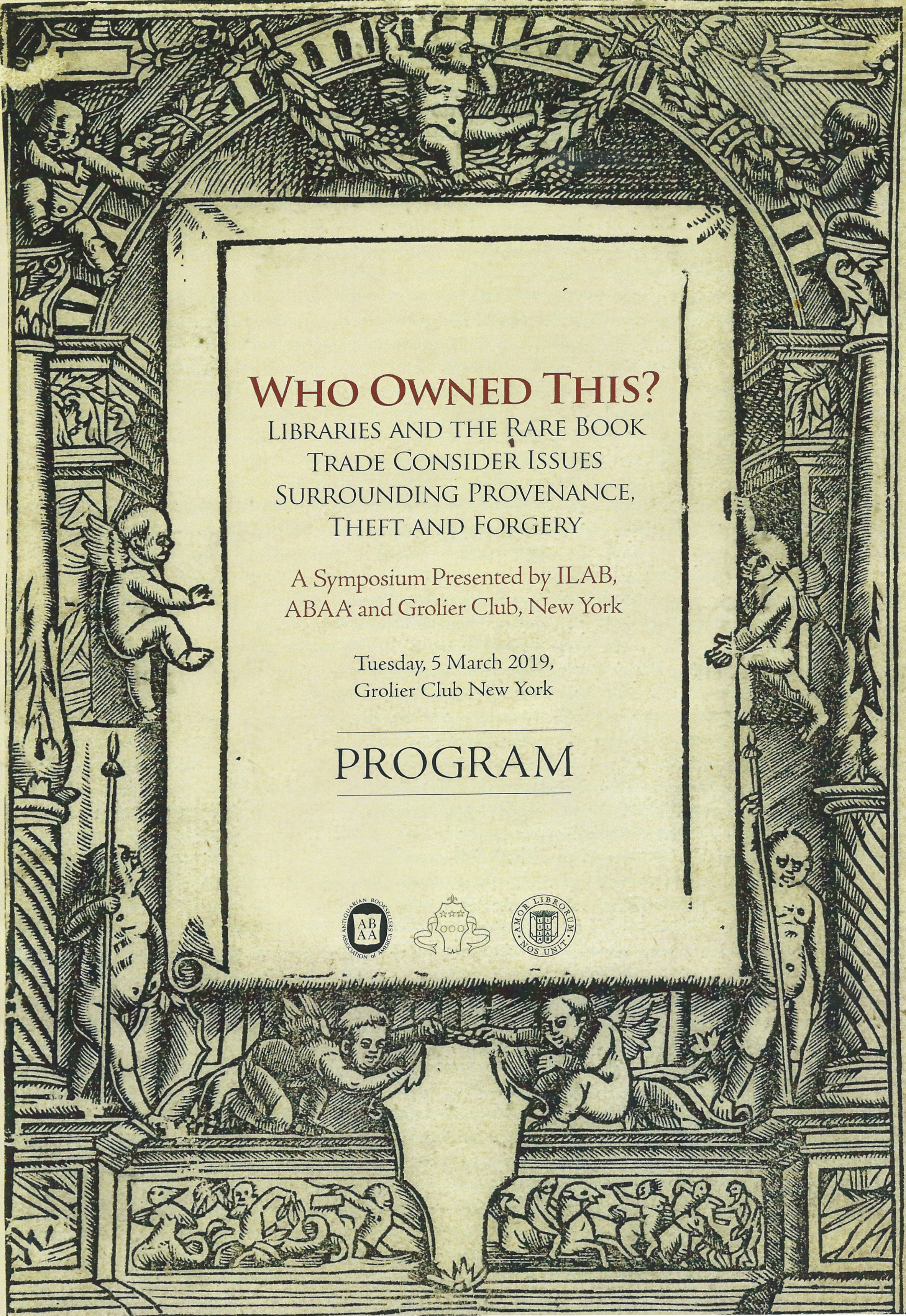 The 8 speakers spoke on various subjects relating to the difficult but timely problems faced by booksellers and librarians in connection with provenance, theft and forgery. I was honored by being assigned the closing position and used it to consider these subjects with a particular regard to the use of databases to protect from theft, recover stolen books and establish provenance. At the end I ventured a few general speculations about how the database technologies of the future may be even more useful for these purposes, including a preview of some of the things that viaLibri will be doing to make use of these technologies. The title of my paper was: “
The 8 speakers spoke on various subjects relating to the difficult but timely problems faced by booksellers and librarians in connection with provenance, theft and forgery. I was honored by being assigned the closing position and used it to consider these subjects with a particular regard to the use of databases to protect from theft, recover stolen books and establish provenance. At the end I ventured a few general speculations about how the database technologies of the future may be even more useful for these purposes, including a preview of some of the things that viaLibri will be doing to make use of these technologies. The title of my paper was: “